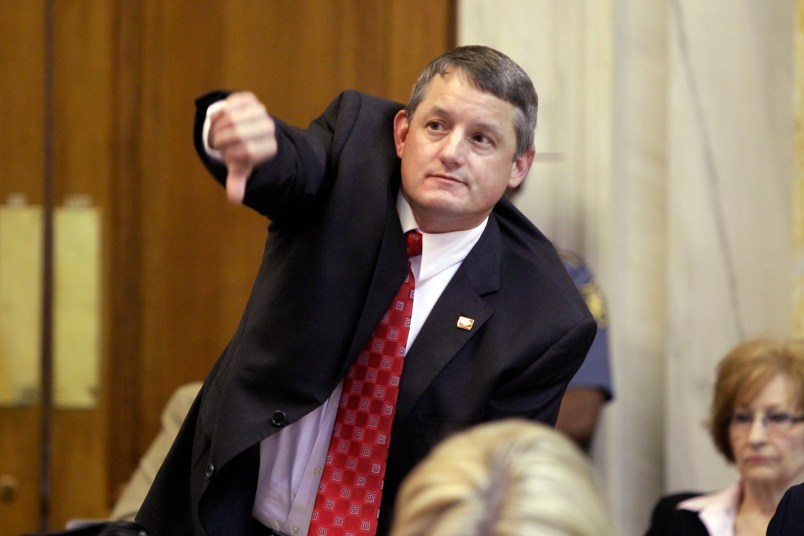The conventional wisdom has said that once states bought into Obamcare’s Medicaid expansion, half of the law’s two-pronged approach to expanding health insurance coverage, they wouldn’t be able to back out of it. More likely, in fact, was that more and more states — regardless of their ideology — would sign onto the expansion. It’s simply too good a deal to pass up.
But a group of Arkansas Republicans appear intent on defying those expectations as early as this month. In doing so, they would halt health coverage for more than 85,000 who have signed up for expanded Medicaid in Arkansas so far.
“ObamaCare is among the worst legislation ever passed,” one newly elected conservative state senator wrote, explaining his opposition to Medicaid expansion. “I do not think that Obamacare is now or ever has been truly about who gets what and how much it will cost. I believe that the real question is if our health care system under ObamaCare will be destroyed in this country for everyone! I think that question only has one answer and it is yes.”
The revanchist Republicans are setting up their state, one of 25 to expand Medicaid this year under the health care reform law, to be the first to strip Obamacare coverage from people who already have it. Arkansas expanded the program, using a unique privatized model, under the tutelage of Democratic Gov. Mike Beebe and with the support of most GOP leaders in the legislature. But a cohort of conservative lawmakers believe they now have enough votes to block funding for the expansion during the legislative session that starts next week.

Arkansas Gov. Mike Beebe (D)
The problem is: Under Arkansas law, the state legislature must vote again this year to accept federal funding for the expansion next year. Expanding Medicaid for 2014 required a 75-percent majority in each chamber, and accepting the 2015 funding does, too. The federal government covers 100 percent of the costs in the first three years and never less than 90 percent after that.
The expansion plan passed the 35-member Senate with one spare vote last year, but one Democratic state senator who voted in favor of expansion resigned last August amid a campaign scandal — and an anti-expansion conservative, John Cooper, took his place last month after a special election.
Another Senate Republican, Missy Irvin, who voted in favor of expansion last year, has now said publicly that she will not support the funding for it this year.
“I had been convinced that the private option might be a first step in the right direction,” she said in a statement to the Arkansas Project, a conservative blog, on Jan. 20. “I now see it is leading us in the wrong direction.”
Those two changes to the legislature’s makeup would leave the expansion funding without the necessary support in the Senate if nothing else changes, as the alternative newsweekly Arkansas Times reported.
Rep. Nate Bell, another Republican who opposes the private option, told the Times there was “no question” that conservatives had enough votes to block funding for expansion. “I think anybody in the Capitol building would agree with that,” he said.
If that came to pass, more than 85,000 Arkansans who have signed up for coverage through the Medicaid expansion would presumably have that coverage stopped in 2015. Arkansas’s alternative Medicaid plan uses Medicaid dollars to pay for low-income residents to purchase private coverage through HealthCare.gov. A select few, those making between 100 and 138 percent of the federal poverty level, would qualify for tax credits to purchase new coverage through HealthCare.gov. But the poorest of them, those below the poverty level, would be left without insurance.
Some expansion supporters, including Beebe, have expressed optimism that they’ll find a way to get the votes. “It was a difficult, difficult task to get three-fourths vote last time,” he told the Associated Press after Cooper won his seat. “It’s still going to be a difficult task to get three-fourths vote, but it’s doable and the logic is there.”
But Senate GOP leadership, which pushed expansion last year, has been more pessimistic that they can maintain enough support after the defections in the first weeks of 2014 have put them at a numerical disadvantage.
“I don’t want to speak for individual members, but I’ve always said that it was very unlikely, if not impossible, that a senator who voted no was going to switch to yes,” Senate President Pro Tem Michael Lamoureux told the Arkansas Times. “Basically, we need the same people to vote yes.”






